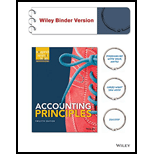
(a)
Accounting principle: These are the guidelines which are to be applied while preparing the accounting books through financial data. It contains the suggestions and rules which have been applied at various points by various entities in order to provide standardized accepted rule-based financial information.
Accounting assumption: These are the accounting practices or principles which are considered to be applied while preparing the financial statements. The results expected from the financial information prepared can be achieved when the accounting assumptions have been followed by the corporation.
Going concern assumption: It is assumed that the entity will operate the business in the long run period. The liquidation of the corporation has not been assumed on a specific date under this assumption.
Accrual assumption: As per this accounting system, transactions are made at the same point when it is incurred irrespective of cash has been received (paid) or not. Like service provided on the account, it has been documented in the financial statement.
Consistency assumption: According to this assumption, it is considered that the accounting policies which are once selected and applied by the entity will continue to be followed in later years also. The decisions taken regarding the estimates and policies will not be altered in future.
Historical cost principle: According to the principle of historical cost, the cost incurred to purchase the asset will be considered to value the assets.
Economic entity concept: According to the economic entity assumption, the records of the entity are separately prepared, considering the owner’s investment as a liability
Time period assumption: According to time period assumption, the financial statements are prepared for a definite and particular period to analyze the financial performance on a timely basis.
To determine: The accounting principle which is violated when company valued the asset at fair value.
(b)
The accounting concept that is violated when company records the truck purchased for personal use in the accounting books of the company.
(c)
The accounting principle that is violated when the company made the financial books for more than a year or 52 weeks.
Want to see the full answer?
Check out a sample textbook solution
Chapter 3 Solutions
Accounting Principles 12E WileyPLUS with Loose-Leaf Print Companion with WileyPLUS Leanring Space Card Set
- Solve this Accounting MCQ 375arrow_forwardFinancial accounting 34.67.89arrow_forwardSuppose that Ken-Z Art Gallery has annual sales of $900,000, cost of goods sold of $590,000, average inventories of $176,000, average accounts receivable of $109,000, and an average accounts payable balance of $54,000. Assuming that all of Ken-Z s sales are on credit, what will be the firm's cash cycle? (Use 365 days a year).arrow_forward
- Computer equipment was acquired at the beginning of the year at a cost of $72,450, with an estimated residual value of $3,250 and an estimated useful life of 6 years. Determine the second-year depreciation using the straight-line method.arrow_forwardI need help finding the accurate solution to this general accounting problem with valid methods.arrow_forwardKindly help me with this General accounting questions not use chart gpt please fast given solutionarrow_forward
- Corp uses the allowance method to account for uncollectible receivables. At the beginning of the year, Allowance for Bad Debts had a credit balance of $1,300. During the year, Corp wrote off uncollectible receivables of $2,500. Corp recorded a Bad Debts Expense of $3,500. What is Corp's year-end balance in Allowance for Bad Debts?arrow_forwardneed help this questionarrow_forwardWhat is the book value of the company if thearrow_forward

 AccountingAccountingISBN:9781337272094Author:WARREN, Carl S., Reeve, James M., Duchac, Jonathan E.Publisher:Cengage Learning,
AccountingAccountingISBN:9781337272094Author:WARREN, Carl S., Reeve, James M., Duchac, Jonathan E.Publisher:Cengage Learning, Accounting Information SystemsAccountingISBN:9781337619202Author:Hall, James A.Publisher:Cengage Learning,
Accounting Information SystemsAccountingISBN:9781337619202Author:Hall, James A.Publisher:Cengage Learning, Horngren's Cost Accounting: A Managerial Emphasis...AccountingISBN:9780134475585Author:Srikant M. Datar, Madhav V. RajanPublisher:PEARSON
Horngren's Cost Accounting: A Managerial Emphasis...AccountingISBN:9780134475585Author:Srikant M. Datar, Madhav V. RajanPublisher:PEARSON Intermediate AccountingAccountingISBN:9781259722660Author:J. David Spiceland, Mark W. Nelson, Wayne M ThomasPublisher:McGraw-Hill Education
Intermediate AccountingAccountingISBN:9781259722660Author:J. David Spiceland, Mark W. Nelson, Wayne M ThomasPublisher:McGraw-Hill Education Financial and Managerial AccountingAccountingISBN:9781259726705Author:John J Wild, Ken W. Shaw, Barbara Chiappetta Fundamental Accounting PrinciplesPublisher:McGraw-Hill Education
Financial and Managerial AccountingAccountingISBN:9781259726705Author:John J Wild, Ken W. Shaw, Barbara Chiappetta Fundamental Accounting PrinciplesPublisher:McGraw-Hill Education





